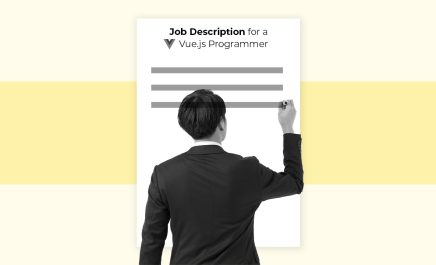How to Source and Hire Vue.js Developers with the Right Experience
- Sathvik Poojary
- April 17, 2025
- 4 Minute Read

Hiring Vue.js developers with the right experience is essential for building responsive, high-performing web applications. Vue.js is a progressive JavaScript framework that supports modern development needs, offering flexibility, efficiency, and ease of integration.
Many people use it to create real-time interfaces, dashboards, and single-page applications. With 15.4% of developers using Vue.js, its popularity continues to grow among startups and enterprises alike.
Demand is driving up competition for hiring Vue.js developers with the appropriate skills. This blog offers a structured approach to sourcing, assessing, and recruiting Vue.js professionals while matching skills with your company’s objectives.
Understanding Vue.js and Its Use Cases
Vue.js is a progressive JavaScript framework for creating single-page applications and user interfaces. Its lightweight core, component-based design, and reactive data-binding system make it perfect for quick and dynamic UI creation.
Important advantages are simple integration, thorough documentation, and support for both Vue 2 and Vue 3 versions. Vue.js lets programmers build maintainable, scalable, modular codebases with better performance.
Vue.js is a great choice for building interactive web applications where responsiveness matters. Use it for:
- Single-page applications (SPAs)
- Progressive web apps (PWAs)
- Admin panels and dashboards
- Real-time data visualization tools
Hiring Vue.js developers with relevant experience ensures your project utilizes these strengths efficiently and meets modern user expectations.
Defining Your Hiring Needs
Evaluate the particular experience level your project requires before employing Vue.js engineers. While mid-level or senior developers are more suited for architectural design and state management, junior developers are suitable for simple component development.
Must-have Vue.js developer skills include proficiency in Vue 2 or Vue 3, Vue Router for navigation, and state management tools such as Vuex or Pinia. Experience with the Composition API is also increasingly essential.
Soft skills like clear communication, flexibility, and problem-solving improve team effectiveness and cooperation. Knowing your project’s scale, technical complexity, and deadlines will help define job roles and select the appropriate Vue.js developer profile.
Screening and Evaluating Candidates
Screening is a crucial step when hiring Vue.js developers. Start by reviewing resumes and portfolios to verify relevant experience and Vue.js projects. Look for detailed documentation and problem-solving approaches.
Evaluate code samples and GitHub contributions to assess clean, modular coding. Projects using Vue 3 and Composition API are especially valuable.
Conduct technical assessments to test practical Vue.js developer skills. Focus on component structure, reactivity, and state management.
Platforms like Codility, HackerRank, and CodeSignal help run standardized coding tests tailored to front-end frameworks. These tools provide consistent, objective scoring, helping you shortlist candidates who meet your technical and collaboration standards.
Conducting Effective Interviews

A structured interview process is essential when hiring Vue.js developers. Start with a technical round focused on core Vue.js concepts.
Ask questions on component lifecycle, reactivity, Vue Router, and state management using Vuex or Pinia. Explore their understanding of Composition API and Vue 3 best practices.
Include behavioral questions to assess problem-solving, adaptability, and team communication. Understand how they handled challenges in past projects.
Live coding challenges are valuable for evaluating how developers apply vue js skills in real-time. Focus on building small components or debugging sample code to assess clarity, logic, and approach.
Assessing Cultural and Team Fit
When recruiting Vue.js developers, it is crucial to identify the appropriate cultural and team fit. Start by assessing how well the applicant fits your organization’s values, communication style, and general work environment. Expectations about cooperation, autonomy, and speed should be addressed early.
Good communication and teamwork abilities are vital, especially when dealing with designers, project managers, and QA teams. Whether you are hiring for a remote or in-house position, make sure the applicant excels in your particular team dynamics. Think about cooperative evaluations or experimental projects that measure actual interaction.
Making the Hiring Decision
Following the interview process, evaluate candidates on technical knowledge, communication, and general fit. Design an evaluation matrix or scoring system to promote impartial decision-making and help prevent prejudice.
Look out for red indicators, such as unclear portfolio justifications, weak problem-solving logic, or an aversion to criticism. Once the appropriate applicant is found, provide a fair offer with defined pay standards, role clarity, perks, and chances for development.
As of April 2025, the average yearly pay for a Vue.js developer in the United States is roughly $110,412. While senior coders can make as much as $141,500, entry-level positions begin at about $104,000. Customizing your proposal to fit these criteria and industry standards helps increase offer acceptance and long-term retention.
Onboarding and Retaining Vue.js Developers

Establishing new hires for success depends on seamless onboarding. Give them access to tools, repositories, and documentation; show them team processes. A well-structured onboarding strategy shortens ramp-up time.
Provide Vue.js certificates, internal knowledge-sharing seminars, and mentorship, among other learning and growth possibilities. Encourage teamwork through inclusive team conversations, feedback sessions, and frequent check-ins.
Encourage long-term retention with defined promotion standards, performance incentives, and organized career routes.
Conclusion
Hiring Vue.js developers requires clarity, structure, and a focus on both technical and interpersonal skills. Every stage is essential, from needs definition and applicant assessment to onboarding and retention.
You raise the possibility of hiring long-term, high-performing talent by knowing the important abilities when you hire Vue.js developers and customizing your strategy to fit corporate objectives. Continue to improve your approach to fit evolving technology needs and developer expectations.
A good Vue.js team will immediately lead to quicker releases, better user experience, and scalable company expansion.
Frequently Asked Questions
What technical skills should a Vue.js developer have?
Ans: A skilled Vue.js developer should be proficient in Vue 2 and Vue 3, Vue Router, Vuex or Pinia, and the Composition API. Familiarity with RESTful APIs, JavaScript frameworks, and modern build tools like Vite or Webpack is also essential.
How do I evaluate a Vue.js developer’s coding skills?
Ans: Review their GitHub repositories and code samples for structure, readability, and component reuse. Use coding platforms like HackerRank or CodeSignal to assess problem-solving skills through Vue-specific challenges.
What is the average salary of a Vue.js developer?
Ans: The average salary for a Vue.js developer varies by region. In the United States, it typically ranges between $104,000 and $141,000 per year, depending on experience and location.
What common mistakes should I avoid when hiring Vue.js developers?
Ans: Avoid vague job descriptions, overlooking soft skills, or skipping technical assessments. Ensure you test practical application, not just theory.
How do I ensure a good cultural fit when hiring?
Ans: Assess communication style, alignment with company values, and collaboration habits during behavioral interviews and trial projects.

Thank you for submitting the details!
We will keep your information safe. Feel free to contact us with any questions at hello@uplers.com
Please check your email for next steps shared by Robert.
















